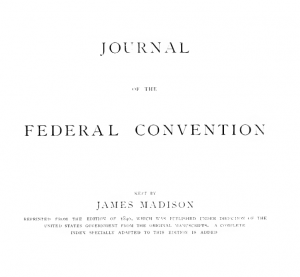 I was reminded by Thomas Kidd in his excellent article about Benjamin Franklin in yesterday’s Wall Street Journal that the Constitutional Convention kicked off activities this month on May 14, 1787 and then really got down to business on May 25. In light of recent claims by David Barton that “every clause of the Constitution has an overarching Biblical theme to it. Because they understood the nature of man, the nature of God, the nature of government, and that all comes from a study of the Bible in the study of history,” I thought it would be good to read through the notes taken by James Madison on a daily basis. For my reading, I am using the 1893 version edited by E.H. Scott and published by Albert, Scott & Company. Another reading option from the Avalon project provides a link to each day’s entry (see also this one from Ashland University). I hope you will read along with me.
I was reminded by Thomas Kidd in his excellent article about Benjamin Franklin in yesterday’s Wall Street Journal that the Constitutional Convention kicked off activities this month on May 14, 1787 and then really got down to business on May 25. In light of recent claims by David Barton that “every clause of the Constitution has an overarching Biblical theme to it. Because they understood the nature of man, the nature of God, the nature of government, and that all comes from a study of the Bible in the study of history,” I thought it would be good to read through the notes taken by James Madison on a daily basis. For my reading, I am using the 1893 version edited by E.H. Scott and published by Albert, Scott & Company. Another reading option from the Avalon project provides a link to each day’s entry (see also this one from Ashland University). I hope you will read along with me.
I plan to look for the Bible in the notes of the Convention. Surely, if the Bible influenced much of the Constitution, I will find frequent references to it in my reading. I will report every one I find.
I hope readers will also read along in order to keep me honest and help discern the influences which animated the delegates to create the form of government we now enjoy.
Madison’s first dated entry was May 14:
Monday, May 14th, 1787,
Was the day fixed for the meeting of the Deputies in Convention, for revising the federal system of government. On that day a small number only had assembled. Seven States were not convened till,Friday, May 25th.
When the following members appeared: (p. 53)
Madison then listed the delegates in the first meeting.
The first order of business on May 25, 1787 was to elect a president. George Washington was unanimously chosen:
Mr. Robert Morris informed the members assembled, that, by the instruction and in behalf of the deputation of Pennsylvania, he proposed George Washington, Esquire, late Commander-in-Chief, for President of the Convention.* Mr. John Rutledge seconded the motion, expressing his confidence that the choice would be unanimous; and observing, that the presence of General Washington forbade any observations on the occasion which might otherwise be proper.
General Washington was accordingly unanimously elected by ballot, and conducted to the Chair by Mr. R. Morris and Mr. Rutledge ; from which, in a very emphatic manner, he thanked the Convention for the honor they had conferred on him; reminded them of the novelty of the scene of business in which he was to act, lamented his want of better qualifications, and claimed the indulgence of the House towards the involuntary errors which his inexperience might occasion.
Following the selection of a secretary and rules committee, the Convention adjourned until May 28.